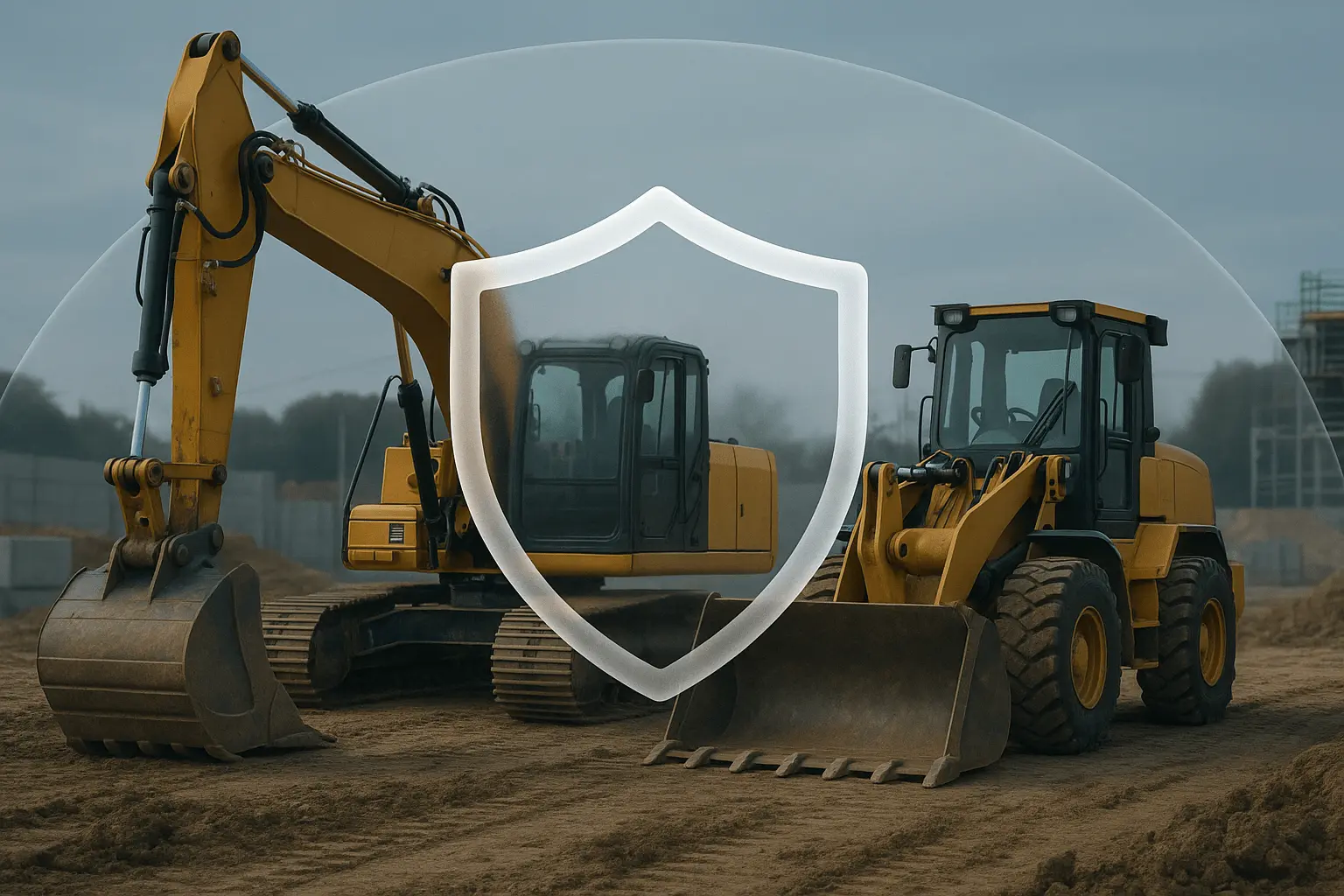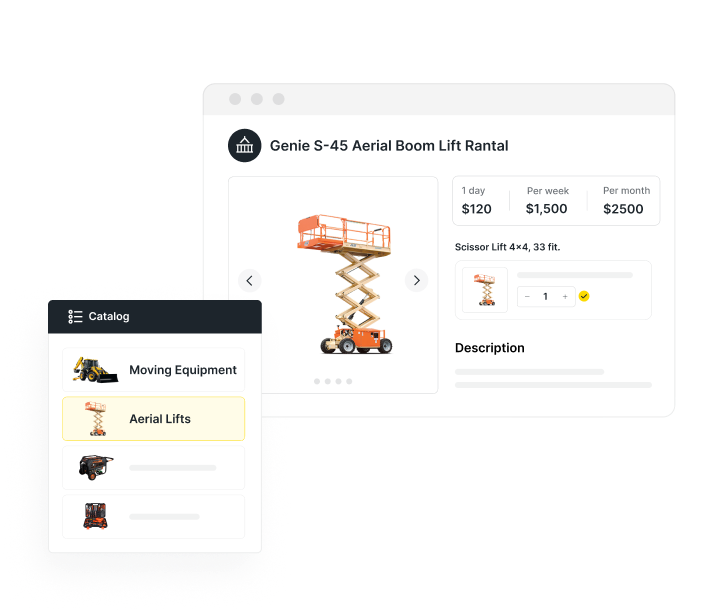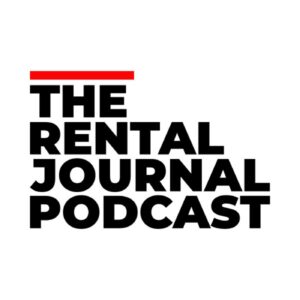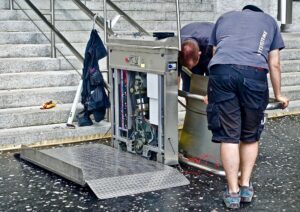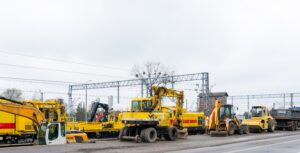Table of Contents
- What Is Rental Equipment Insurance?
- Understanding Damage Waivers vs. Insurance
- Types of Rental Insurance
- What Does a Basic Equipment Insurance Policy Cover?
- General Liability Insurance for Equipment Rental Businesses
- What’s Important for Protecting Your Equipment Rental Business
- Potential Equipment Insurance Costs
- Commonly Asked Questions
Equipment rental insurance is a form of insurance that you can get if you rent out equipment to customers. It’s instrumental in helping avoid costly losses and downtime for your rental business.
Equipment coverage can insure large pieces, such as excavators, as well as the tools and inventory you rent out, such as post-hole diggers.
What Is Rental Equipment Insurance?
Insurance for rental equipment covers the items you rent out, such as tools, equipment, and other inventory. Rental business insurance can be bought to cover any kind of equipment.
Having rental equipment insurance coverage will protect you in case something happens to your equipment, such as theft or a major accident. There are also other options for your business that’ll cover you beyond just lost equipment.
When it comes to rental equipment insurance, you’ll also have policy specifics depending on the equipment you rent out. If you offer heavy equipment, your insurance policy may assume that you’re renting to individuals or companies that are insured and licensed.
There may also be limits on how long you can rent out equipment, as the longer the rental period, the greater the likelihood of damage or loss. You can help protect yourself with proper insurance coverage and the rental contract you use, which can stipulate renters liability insurance for your customers.
Looking for streamlined protection? Quipli’s rental damage waiver feature simplifies your damage waiver process while safeguarding both your equipment and rental revenue. Learn how our integrated platform helps you protect your valuable assets with automated verification and real-time tracking.
Understanding Damage Waivers vs. Insurance
Before diving into traditional insurance options, it’s important to understand damage waivers—a critical protection tool that many equipment rental businesses use alongside or instead of requiring customer insurance.
What is a Damage Waiver?
A damage waiver is a contractual agreement between you and your customer, not an insurance policy. As insurance expert Damien Brooks explains: “The damage waiver is actually something that a rental company sells to their customer and it’s a contractual agreement. It says to the customer: “if there’s damage that’s done to the unit while it is in your possession, we won’t come after you for that damage. I want to stress that it’s not insurance.”
Key Benefits for Rental Companies:
- Risk Mitigation: Transfers liability away from customers who may have insufficient insurance coverage
- Revenue Generation: Creates an additional income stream from protection fees
- Streamlined Claims: You control the claims process through your own insurance rather than dealing with multiple customer insurance companies
- Customer Convenience: Eliminates the need for customers to modify their existing insurance policies
Benefits for Your Customers:
Damage waivers provide significant value to renters by eliminating complexity and protecting their insurance premiums. Customers don’t need to contact their insurance agents, increase coverage limits, or risk premium increases from claims on equipment they don’t own.
As Brooks notes: “For the renter, I think that there are a whole number of issues around that and quite honestly, being able to just turn the unit back in no matter what’s happened at the end of the rental and say, Hey, I bought the waiver, you guys deal with it, I think is way better.”
How Quipli Streamlines Damage Waivers
Through Quipli’s partnership with SEIS (Specialty Equipment Insurance Services), you can easily generate and manage damage waivers directly within your rental management system. This integration allows you to:
- Automatically Generate Waivers: Create compliant damage waiver agreements for each rental
- Seamless Processing: Include waiver options during online checkout or point-of-sale transactions
- Insurance Backing: Access specialized equipment rental insurance through SEIS to back your waiver program
- Simplified Administration: Track waiver sales, process claims, and manage documentation all in one platform
This unified approach eliminates the operational complexity typically associated with damage waiver programs while ensuring you have proper insurance backing for your protection offerings.
Types of Rental Insurance
Equipment rental business insurance is available for various types of equipment. There are different coverage options and plans based on the equipment you rent out.
Naturally, rental insurance will vary by business. For instance, insurance types and coverage options will be different for a party rental business than for a golf cart rental business. Heavy equipment rental insurance will have different options as well.
Here are some key types of insurance for equipment rentals that you’ll likely encounter on the market.
Floater Coverage
Also known as inland marine coverage, floater coverage is a type of add-on coverage that covers rental properties not covered by other policies. This includes property you rent from others as well as newly acquired rental equipment.
Commercial Property Coverage
Commercial property coverage is a broad category of insurance that, in some cases, covers the things you own and use as part of your business along with your company’s physical premises and related real estate. This could include office furniture, computers, and non-rented equipment and appliances.
Commercial property coverage covers rental businesses in the event of damage or loss, such as employee theft.
Commercial Auto Coverage
Commercial auto coverage is for the vehicles you own and use as part of your business, such as delivery vehicles. This will cover vehicles you rent, lease, borrow, or own.
Umbrella Coverage
Umbrella and excess coverage will protect you if a claim goes beyond its limits. For example, if you have a major liability claim from a lawsuit, umbrella coverage will kick in if the claim exceeds the limits of the primary general liability policy.
Liability Insurance
Comprehensive liability protection is essential for equipment rental businesses, covering several critical areas:
Professional Liability: Protects against claims related to professional services, errors, or omissions in your rental recommendations or equipment maintenance advice.
Premises Liability: Covers accidents or injuries that occur on your rental yard, showroom, or business property.
Directors and Officers (D&O) Liability: Essential for incorporated businesses, protecting company leaders from personal liability in lawsuits alleging mismanagement or breach of fiduciary duty.
Pollution Clean-Up Insurance
Environmental liability coverage protects your business if rented equipment causes environmental damage or contamination. This is particularly important for construction equipment rentals involving fuel-powered machinery, hydraulic systems, or equipment used near water sources.
Other Coverage Options
There are also other specialized insurance services offered to rental businesses, such as business income coverage. Business income coverage covers lost income if the business can’t conduct business due to a covered event.
For example, business income coverage for off-premises utility services will replace business income if they can’t conduct business due to unexpected utility interruptions.
Another common example is property-in-transit coverage, which will cover your rental property if it’s damaged during shipment.
What Does a Basic Equipment Insurance Policy Cover?
There are two main types of rental equipment insurance coverage: covered property and replacement cost. Covered property covers anything you rent out, while replacement cost coverage is for equipment that must be replaced.
Good basic equipment insurance should include broad coverage, protecting such things as lost or stolen equipment, equipment damaged due to misuse or weather, and cleanup for covered incidents.
Covered Property
Covered property is coverage for pretty much anything you rent out. For example, covered property coverage would cover flatware, serving utensils, and party supplies for a wedding rental company.
Other items that would fall under the heading of covered property include wood chippers for a lawn equipment rental business and video recording equipment for a media rental company.
Replacement Cost
Replacement cost coverage is for equipment that becomes irreparably damaged or lost. Replacing such equipment can be costly. This coverage can ease the financial burden by providing some or all of the money required for replacement.
General Liability Insurance for Equipment Rental Businesses
Insurance for equipment rental generally includes covered property and replacement cost coverage, but you’ll also need general liability insurance to protect you beyond rental-specific issues. General liability coverage will protect you from lawsuits customers file against you.
Lawsuits can arise for a variety of reasons. For example, a client that’s injured while using equipment they rented from you may file a lawsuit to cover their injuries and distress. Similarly, a property owner might sue you if a piece of equipment you rented out to them accidentally destroys a building. General liability insurance can help protect your business from having to use valuable resources to fight such lawsuits.
General liability coverage can protect your business against lawsuits, damages, and lost equipment. But it can also protect against negligence, slander, errors and omissions, and contractual liability.
The risks of owning a rental equipment business are unique and diverse, but good insurance can greatly hedge many of them. As mentioned, a good rental contract can also protect your business from loss.
It helps to know what your insurance covers and what it doesn’t.
For example, what happens if a customer simply doesn’t return the equipment they rented? What happens if they lend out the equipment to someone else and that person damages your equipment or injures someone? These are the kinds of questions you’ll want to think through and address with your insurance agent.
What’s Important for Protecting Your Equipment Rental Business
Protecting your equipment rental business requires a strategic approach that balances comprehensive coverage with operational efficiency. Understanding which insurance protections are essential versus supplementary can help you make informed decisions while managing costs effectively.
Must-Have Insurance Coverage:
Your equipment rental business absolutely needs general liability insurance, commercial property coverage for your rental inventory, and commercial auto coverage if you provide delivery services. These three form the foundation of protection for any rental operation.
As insurance expert Damien Brooks explains: “If your customer doesn’t have insurance, you shouldn’t rent it to them without a waiver, and most homeowners won’t have the proper type of insurance. A homeowner’s policy is generally not going to be good enough to cover the type of equipment that you’re renting to them.”
Important But Situational Coverage:
Depending on your business model, you may need additional protection. Umbrella coverage becomes critical as your fleet value increases—typically recommended once your total equipment value exceeds $500,000. Professional liability insurance is essential if you provide equipment recommendations, training, or maintenance services to customers.
Nice-to-Have Coverage:
Business income coverage and pollution clean-up insurance provide valuable peace of mind but may not be cost-effective for smaller operations. These become more important as your business scales and takes on larger, more complex rental projects.
When to Evaluate Your Coverage:
Review your insurance needs annually or after major business changes such as adding new equipment categories, expanding to additional locations, or significantly increasing your fleet size. Major equipment purchases, particularly high-value construction equipment, should trigger immediate coverage evaluation.
Example: Mid-Size Construction Equipment Rental
Consider “Rocky Mountain Equipment,” a hypothetical two-location construction equipment rental company with a fleet worth $2.8 million, including excavators, generators, and scaffolding systems.
Their Essential Coverage Strategy:
- General Liability: $2 million per occurrence with equipment damage coverage
- Commercial Property: Full replacement cost coverage for their $2.8 million fleet
- Umbrella Policy: $5 million to protect against major liability claims
- Commercial Auto: Comprehensive coverage for their delivery trucks and trailers
- Professional Liability: $1 million coverage since they provide equipment operation training
Cost-Benefit Analysis: This comprehensive coverage package costs approximately $28,000-35,000 annually—roughly 1.2% of their fleet value—but protects against potentially catastrophic losses that could exceed $1 million in a single incident.
Potential Equipment Insurance Costs
Understanding insurance costs helps you budget effectively and compare coverage options. Equipment rental insurance premiums typically range from 0.5% to 2.5% of your total equipment value annually, with several factors influencing your specific rates.
Cost Factors That Impact Your Premiums:
Equipment Type and Value: Heavy construction equipment like excavators and cranes command higher premiums due to replacement costs and liability risks. Small tools and party equipment typically cost less to insure.
Business Location: Urban areas with higher theft rates or regions prone to natural disasters will increase your premiums. Businesses in Chicago, for example, may pay 15-20% more than rural locations.
Claims History: A clean claims record can reduce premiums by 10-25%, while frequent claims will increase costs significantly.
Safety Programs: Businesses with documented safety training, equipment inspection protocols, and driver verification programs often receive premium discounts of 5-15%.
Typical Premium Ranges by Business Size:
- Small Operations ($100K-500K equipment value): $2,000-8,000 annually
- Mid-Size Businesses ($500K-2M equipment value): $8,000-25,000 annually
- Large Operations ($2M+ equipment value): $25,000+ annually
Regional Variations: Insurance costs vary significantly by location. Construction equipment rental businesses in California or Florida typically pay 20-40% higher premiums than those in the Midwest due to natural disaster risks and regulatory requirements.
Note: These are general estimates. Actual costs depend on your specific business profile, coverage limits, and regional factors. Always obtain quotes from multiple insurers for accurate pricing.
Commonly Asked Questions
What risks won’t insurance cover?
Most equipment rental insurance policies have standard exclusions that business owners should understand. Typical exclusions include normal wear and tear, gradual deterioration, and mechanical breakdowns not caused by accidents.
Insurance generally won’t cover losses due to war, terrorism, nuclear hazards, or intentional damage by the policyholder. Many policies also exclude coverage for equipment used outside its intended purpose: for instance, using a generator designed for construction sites in a flood zone.
Important gaps to note: Most standard policies don’t cover cyber liability, employment practices liability, or pollution caused by fuel spills. These require separate coverage endorsements.
Can an Insurance Program Help My Clients?
Yes, having comprehensive insurance can actually become a competitive advantage when working with commercial clients. Many contractors and businesses require their rental vendors to carry specific insurance minimums and can provide certificates of insurance.
Some rental businesses offer insurance verification services to their customers, helping contractors meet job site insurance requirements. This value-added service can justify premium pricing and strengthen customer relationships.
Additionally, customers appreciate rental companies that maintain proper insurance because it demonstrates professionalism and financial stability—factors that matter when renting expensive construction equipment.
Expert Perspective: According to industry specialist Damien Brooks: “There’s definitely been a shift in the market in the past couple of years towards utilizing the waivers more and more and bigger and bigger companies doing it… These customers are asking themselves: do we want to have this exposure on our policy or do we want to put it back on the rental company?”
Should I have multiple policies?
The answer depends on your business complexity and risk tolerance. Many rental businesses benefit from working with specialized insurance brokers who can package multiple coverage types into comprehensive programs.
Single-carrier advantages: Simplified claims processing, potential multi-policy discounts, and unified coverage management.
Multi-carrier approaches: May offer better coverage options for specific risks and potentially lower overall costs through competitive pricing.
For most equipment rental businesses, the key is ensuring no coverage gaps exist between policies rather than focusing on the number of carriers involved.
What else can I do to prevent equipment theft?
Beyond insurance, proactive theft prevention protects your bottom line and reduces claim-related premium increases. Modern rental businesses employ multiple theft prevention strategies:
Technology-Based Prevention:
- GPS tracking systems that provide real-time location monitoring
- Equipment immobilizers that prevent unauthorized use
- Geofencing alerts when equipment moves outside designated areas
Operational Best Practices:
- Thorough customer screening including license verification and insurance validation
- Regular equipment check-ins and maintenance inspections
- Secure storage facilities with controlled access and surveillance
Digital Documentation: Comprehensive rental contracts with clear terms, digital signatures, and automated follow-up for overdue returns help establish clear accountability.
Modern rental management platforms like Quipli integrate many of these theft prevention features directly into your workflow, making protection part of your standard operating procedures rather than additional administrative tasks.
Expert Insight: As Damien Brooks, Director of Insurance at Specialty Equipment Insurance Services, notes: “95% of the renting companies that I do business with are fantastic at doing that on their own. They know who they want to rent to, who their target market is. They get a real sense very quickly whether or not they want to entrust this individual with a $100,000, $200,000 piece of equipment or not because they’ve got a significant rental.”
Additional Resources
Watch this Rental Roundtable episode on Equipment Rental Damage Waivers 101
Learn More About Equipment Protection:
- Download our guide: How to Calculate Your Total Equipment Value
- Read more: How to Value a Rental Business
Make Rentals Easy With the Right Partner
The less you have to worry about as an equipment rental business owner, the better. Proper insurance coverage can ease your mind regarding what might happen to your equipment when it’s in customers’ hands.
Another way to reduce your business-related stress is implementing a modern rental inventory management system. Quipli offers a unified platform that handles the complex work of managing your rental inventory, customer relationships, and equipment protection—all in one system.
Our platform eliminates rental gridlock by integrating equipment tracking, damage waiver processing, and insurance verification into streamlined workflows. This means less time on administrative tasks and more focus on growing your business profitably.
Ready to break free from operational complexity? Contact us today to see how Quipli’s unified rental platform can transform your equipment protection strategy while simplifying your entire operation.

